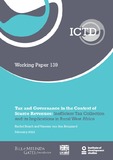| dc.contributor.author | Beach, Rachel | |
| dc.contributor.author | van den Boogaard, Vanessa | |
| dc.date.accessioned | 2022-02-28T15:53:10Z | |
| dc.date.available | 2022-02-28T15:53:10Z | |
| dc.date.issued | 2022-02-28 | |
| dc.identifier.citation | Beach, R. and van den Boogaard, V. (2022) Tax and Governance in the Context of Scarce Revenues: Inefficient Tax Collection and its Implications in Rural West Africa, ICTD Working Paper 139, Brighton: Institute of Development Studies, DOI: 10.19088/ICTD.2022.005 | en |
| dc.identifier.uri | https://opendocs.ids.ac.uk/opendocs/handle/20.500.12413/17194 | |
| dc.description.abstract | In recent years, domestic and international policy attention has often focused on broadening the tax base in order to include a greater share of the population in the ‘tax net’. This is based, in part, on the hope that the expansion of taxation will result in positive ‘governance dividends’ for taxpayers. However, the implications of extending the tax base in rural areas in low-income countries has been insufficiently considered. Through the case studies of Togo, Benin, and Sierra Leone, we demonstrate that extending taxation to rural areas is often highly inefficient, leading to few, if any, revenue gains when factoring in the costs of collection. Where revenues exceed the costs of collection, they often only cover local government salaries with little remaining for the provision of public goods and services. The implications of rural tax collection inefficiency are thus significant for revenue mobilisation, governance and public service delivery, accountability relationships with citizens, and taxpayer expectations of the state. Accordingly, we question the rationale for extending taxation to rural citizens in low-income countries. Instead, we argue for a reconceptualisation of the nature of the fiscal social contract, disentangling the concept of the social contract from the individual. Rather, a collective social contract places greater emphasis on the taxation of wealth and redistribution and recognises that basic rights of citizenship are not, or should not, be contingent on paying direct taxes to the government. Rather than expanding taxation, we argue for the expansion of political voice and rights to rural citizens, through a ‘services-first’ approach. | en |
| dc.language.iso | en | en |
| dc.publisher | Institute of Development Studies | en |
| dc.relation.ispartofseries | Working Paper;139 | |
| dc.rights.uri | http://creativecommons.org/licenses/by/4.0/ | en |
| dc.subject | Governance | en |
| dc.title | Tax and Governance in the Context of Scarce Revenues: Inefficient Tax Collection and its Implications in Rural West Africa | en |
| dc.type | Other | en |
| dc.rights.holder | Institute of Development Studies 2022 | en |
| dc.identifier.team | Governance | en |
| dc.identifier.doi | 10.19088/ICTD.2022.005 | |
| rioxxterms.funder | Default funder | en |
| rioxxterms.identifier.project | Default project | en |
| rioxxterms.version | VoR | en |
| rioxxterms.versionofrecord | 10.19088/ICTD.2022.005 | en |
| rioxxterms.funder.project | 9ce4e4dc-26e9-4d78-96e9-15e4dcac0642 | en |


